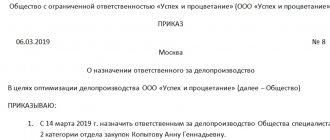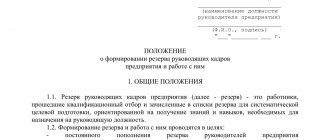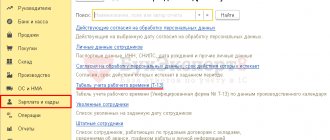(11 ratings, average: 5,00 out of 5)
Simplified personnel records for micro-enterprises were allowed to be used in the Russian Federation from 01/01/2017. Small enterprises and individual entrepreneurs have the opportunity to maintain personnel records in a reduced volume. Before the government introduced this relaxation, small businesses were forced to carry out personnel records in a standard manner, drawing up many different papers - working time schedules and shift sequences, wage regulations, internal work regulations and other documents adopted in the field of personnel management and subject to mandatory preparation , implementation, storage. Using a simplified procedure for accounting and paperwork in working with personnel, entrepreneurs and organizations have the right to refuse to complete many papers, lawfully replacing them with proper detail of the employment contract concluded with each individual employee.
- Personnel records according to a simplified scheme
- Who in the Russian Federation can use the simplified procedure for personnel accounting
- Conclusion of a contract with the hired employee
- Civil contract
- Employment contract
- What documents are needed to draw up an employment contract?
Personnel records according to a simplified scheme
For example, a certain employer took advantage of the legal right to switch to maintaining personnel records according to a simplified scheme. He provides a workplace to his first employee. In this situation, it is necessary to properly comply with the relevant formalities, which requires the employer to carry out the following actions:
- drawing up and signing by both parties of an agreement regulating labor relations;
- execution of an order (instruction) on the employment of a specific employee at the enterprise;
- entering the necessary information (data) into the work book belonging to the hired employee;
- filling out the personal card of a subject officially enrolled in the organization’s staff.
All of these points listed above should be considered in more detail, since a detailed study of them will allow us to better understand how exactly personnel records have been simplified since 2020 for business entities classified as micro-enterprises and individual entrepreneurs. Managers and administrative employees of relevant commercial organizations who are directly responsible for office work in the personnel field should be well versed in how to hire and fire an employee under the simplified scheme permitted by the state.
How HR records have been simplified for micro-enterprises
Such enterprises may completely or partially refuse to approve local regulations containing labor law standards, such as:
- internal labor regulations;
- regulations on remuneration and bonuses;
- shift schedule, etc.
Moreover, all conditions regulated by non-applicable acts must be included directly in employment contracts with employees.
The standard form of an employment contract was approved by Decree of the Government of the Russian Federation of August 27, 2020 No. 858 (hereinafter referred to as Resolution No. 858).
To apply simplified personnel records, a microenterprise must be included in the unified register of small and medium-sized businesses. If it loses its status and is excluded from the register, a micro-enterprise must, within four months, complete all personnel documents that it refused to maintain while in the status of a micro-enterprise.
Read more General period for the heir to accept an inheritance
The standard form of an employment contract, approved by Resolution No. 858, is mandatory for use. While the use of simplified personnel records itself is not mandatory. In practice, this means the following for an enterprise.
1. If in an existing micro-enterprise the employment contracts concluded with employees contain all the conditions required for organization, remuneration and provision of social guarantees, then there is no need to change the employment contracts.
2. If a micro-enterprise decides that it will adopt local regulations containing labor law norms in the future and does not intend to abandon them, then there is no need to change the texts of concluded employment contracts.
3. If a micro-enterprise decides to keep personnel records in a simplified form, then it must necessarily bring the texts of concluded employment contracts in accordance with the standard form and include in them all the conditions regulated by local regulations. Labor relations with newly hired employees should be formalized on the basis of a standard form of an employment contract.
Read in the taker
When drawing up an employment contract using a standard form, you need to take into account the following information: for foreign citizens or stateless persons, the following information is indicated:
- on a work permit or patent - when concluding an employment contract with a foreign citizen or stateless person temporarily staying in the Russian Federation;
- on a temporary residence permit in the Russian Federation - when concluding an employment contract with a foreign citizen or stateless person temporarily residing in the Russian Federation;
- on a residence permit - when concluding an employment contract with a foreign citizen or stateless person permanently residing in the Russian Federation;
- details of a voluntary health insurance agreement (policy) or an agreement concluded by an employer with a medical organization on the provision of paid medical services with a foreign citizen or stateless person temporarily staying in the Russian Federation.
Practical encyclopedia of an accountant
All changes for 2020 have already been made to the berator by experts.
In answer to any question, you have everything you need: an exact algorithm of actions, current examples from real accounting practice, postings and samples of filling out documents.
Who in the Russian Federation can use the simplified procedure for personnel accounting
It should be immediately noted that a simplified accounting and paperwork scheme for working with personnel is available to any business entity that legally belongs to the category of micro-enterprises. In the jurisdiction of the Russian Federation, microenterprises are considered to be small commercial structures (organizations, enterprises), as well as individuals officially registered as individual entrepreneurs.
The Tax Administration (FTS) is authorized to maintain a special register containing information about representatives of small and medium-sized businesses in the Russian Federation. This register contains legal entities (LLC) and individual entrepreneurs (IP) that meet the following requirements:
- the amount of annual revenue does not exceed 120 (one hundred and twenty) million rubles; staffing – no more than 15 people;
- state participation share – maximum 25%.
If a business entity is included in this register, it has the right to switch to a simplified procedure for personnel records.
To switch to a simplified system of personnel records management and accounting, an authorized official of an organization present in the above-mentioned register of small businesses should issue an order (instruction) that the enterprise (individual entrepreneur) from a certain date refuses to use previously used documentation in the field of personnel management . It is necessary to clearly indicate that the personnel regulations (regulations) previously in force at the enterprise now lose their legal force. After this, you can limit yourself to concluding standard employment contracts with hired employees.
If a business entity officially registered and began operations after 01/01/2017, it will only be enough for him to issue an order to switch to a simplified procedure for managing personnel, and in this case there is no need to mention regulations that are no longer legally valid.
Order refusing to use local personnel documents
It is necessary to issue an order stipulating that the previous local acts on labor relations are no longer valid.
Sample order refusing to use local personnel documents
An order refusing to use local personnel documents can be found here.
If the employer ceases to be a small business entity, which is classified as a micro-enterprise, and appropriate changes are made to the information about it in the unified register, then no later than four months from the date of making the corresponding changes in the unified register, the regulation of labor relations and other directly related relations with them of this employer will have to be carried out in accordance with labor legislation and other regulatory legal acts containing labor law norms, without taking into account the specifics established by Chapter 48.1 of the Labor Code of the Russian Federation, namely Art. 309.2 of the Labor Code of the Russian Federation (Article 309.1 of the Labor Code of the Russian Federation). Consequently, the employer, within four months from the date of making the relevant changes to the unified register, will be obliged to restore all local regulations (internal labor regulations, regulations on remuneration, regulations on bonuses, shift schedules, etc.).
Good afternoon, site readers.
From January 1, 2020, micro-enterprises are exempt from internal personnel documents. They will not need to draw up internal labor regulations, regulations on wages, bonuses, shift schedules, etc. But how to check whether you are a micro-enterprise or not? How to correctly formalize a refusal to use personnel records? How to replace all these personnel documents? Is there a standard form of an employment contract or not? You will find answers to all these questions in this article.
Read more Court decision recognizing property as escheat
After the release of Federal Law No. 348-FZ of July 3, 2020, micro-enterprises were given the opportunity to no longer maintain personnel records from January 1, 2020. This means that small companies and individual entrepreneurs will be allowed to completely or partially refuse to draw up and apply local regulations - internal labor regulations, regulations on wages, regulations on bonuses, shift schedules and other documents (Article 8 of the Labor Code of the Russian Federation).
Micro-enterprises are firms and individual entrepreneurs whose last year income does not exceed 120 million rubles,
The average number of employees is 15 people.
the total share of legal entities included in the LLC is no more than 49%.
Are you classified as
a micro-enterprise according to the Federal Tax Service?
The Federal Tax Service maintains a unified register of small and medium-sized businesses. This register is publicly available on the Federal Tax Service website.
You can follow the link and determine whether information about your company is contained in this register or not? To do this, follow the link.
In the opened form
Enter the TIN number in the search bar and click the Find button.
You can write the name of the organization. But faster by TIN or OGRN.
Now a window with the result has opened.
You see that the organization is a micro-enterprise. If you click on the name of your organization in this window, an extract from the unified register of small and medium-sized businesses with an enhanced digital signature will be downloaded.
How to formalize a refusal to maintain
personnel records from January 1, 2020?
Now you know for sure whether your organization is a micro-enterprise or not. And if it does, then you can safely refuse to use personnel records. But only this requires an order to refuse to use personnel documents. At the same time, for companies and individual entrepreneurs registered before January 1, 2020, the order must additionally state that previously developed documents become invalid.
New standard form of employment contracts.
It will be necessary to conclude employment contracts with all employees in a standard form approved by Decree of the Government of the Russian Federation of August 27, 2020 No. 858 “On the standard form of an employment contract concluded between an employee and an employer who is a small business entity that relates to micro-enterprises.”
A standard form of an employment contract can be downloaded by following the link.
What to do if you cease to be
a micro-enterprise ?
If you move from microenterprise status to small (medium) business, the option of not maintaining personnel records is lost. You will have four months to approve all necessary documents. I hope everything works out for you. I wish you good luck in the difficult work of an accountant and that audits bypass you.
Read more Federal Tax Service pre-trial settlement of tax disputes
Federal Law No. 348-FZ of July 3, 2020 amended the Labor Code, according to which micro-enterprises received the right to maintain personnel records in a simplified manner.
Drawing up an order (instruction) for employment
The publication by the employer of an order (instruction) on the employment of a specific employee is considered a necessary act that legally records the fact that an individual has been hired from a certain date. This document is the basis for paying the employee the agreed salary, and is also mentioned when entering the necessary information about hiring into his work book.
The main details of the order (instruction) on the employment of an employee by the employer:
- name of the employer (organization, individual entrepreneur);
- date of preparation and registration number of the document;
- the period of employment, limited by the date of hiring and the date of the intended departure of the employee;
- Full name of the employee being registered;
- name of the unit;
- position of the hired employee;
- conditions of employment, nature of work;
- the amount of the agreed rate (salary);
- the amount of the stipulated allowance;
- the duration of the probationary period (maximum 3 months) provided for in the contract;
- the basis for issuing this order (link to the employment contract);
- signature of the manager (with transcript);
- signature of the employee confirming familiarization with this order.
Personnel documentation required to be maintained if there are hired personnel
Personnel records for individual entrepreneurs with hired employees consist of the following mandatory documents:
- Employment contract;
- Employment order;
- Employee's personal card;
- Work book;
- Time sheets and calculation of wages;
- Order on granting vacations;
- Vacation schedule;
- Order on bonus payments to employees;
- An order to terminate the employment relationship with an employee;
- Internal regulations;
- Staffing table;
- Books for recording the movement of labor books;
- Books of orders and other personnel documents;
- Travel documents;
- Agreement on full financial liability (if the employee’s work involves material assets);
- Shift schedule (if the employee is hired for shift work);
- Trade secret provisions;
- Job descriptions;
- Other documents required to be maintained in connection with the specifics of the individual entrepreneur’s activities.
Entering information about employment into the work book
The work book of an individual is a kind of dossier containing detailed information about all the facts related to his employment:
- acceptance (registration) for work in a certain position, transfer to another position or to another division of the organization;
- dismissal (downsizing);
- other circumstances, events.
Each entry made by the employer in the work book must be substantiated by a reference to the relevant document (order, regulation, legal act) indicating its name, number and date.
Information about employment must be entered by the employer into the work book if the employee worked more than 5 (five) days at the main place of employment under an employment contract.
Small business, micro-enterprises and their great features
You will learn:
- What nuances of drawing up local regulations and employment contracts has the legislator established for micro-enterprises?
- How these employers can lose the right to simplified personnel document flow
- What benefits do small businesses have under administrative sanctions?
HR DOCUMENT FLOW IN MICROENTERPRISES
07/03/2016 The President of Russia signed Federal Law No. 348-FZ “On amendments to the Labor Code of the Russian Federation regarding the specifics of regulating the labor of persons working for employers - small businesses that are classified as micro-enterprises”[1] (hereinafter referred to as Federal Law No. 348-FZ).
Now a new chapter 48.1 has appeared in the Labor Code of the Russian Federation (or, rather, a small chapter consisting of only two articles - 309.1 and 309.2). However, this small chapter changes a lot for microenterprises (hereinafter referred to as microenterprises), greatly simplifying their personnel records management and personnel document flow.
Initially, it was proposed to simplify personnel document flow for both small and small enterprises. But in the end, a decision was made for small enterprises to leave everything as is, but in small enterprises, which employ no more than 15 people (and often less, and sometimes there is only one director or a director and an accountant), now there will be much less personnel documents , but the form and content of the employment contract will become significantly more complicated.
What has changed for micro-enterprises?
Article 309.1 of Federal Law No. 348-FZ establishes general provisions according to which:
- regulation of labor relations and other directly related relations in small enterprises is carried out taking into account the specifics established by Chapter 48.1 of the Labor Code of the Russian Federation;
- if the employer ceases to be an SE, information about this is entered into the unified register of small and medium-sized businesses (hereinafter referred to as the register);
- such an employer is given four months from the date of making the relevant changes to the register to switch to the standard procedure for maintaining personnel document flow.
Article 309.2 gives SE employers the right (but does not oblige them!) to completely or partially refuse to adopt local regulations (hereinafter referred to as LNA) containing labor law norms (internal labor regulations, regulations on remuneration, regulations on bonuses, shift schedules) and etc.).
If they decide to exercise this right, then instead of accepting the LNA, they will have to include in employment contracts with employees conditions regulating issues that, in accordance with labor legislation, should be regulated by the LNA.
Moreover, employment contracts in this case will have to be concluded in a standard form, which will be approved by the Government of the Russian Federation, taking into account the opinion of the Russian Tripartite Commission for the Regulation of Social and Labor Relations.
Of course, if there are really only 1-2-3 employees in an MP, then it is easier to make employment contracts according to a standard form.
If the employer-MP has all 15 (and even 10-12) employees, it is much more convenient to establish for them standards of work and behavior during working hours in a normative, rather than contractual way, individually within the framework of their powers granted by the Labor Code of the Russian Federation, approving the corresponding LNA, and, as necessary, also unilaterally making changes to these LNA.
Chapter 48.1 of the Labor Code of the Russian Federation will come into force 180 days after the official publication of Federal Law No. 348-FZ.
ADMINISTRATIVE WARNINGS FOR SMALL BUSINESSES
Federal Law No. 316-FZ of July 3, 2016 “On Amendments to the Code of the Russian Federation on Administrative Offences” [2] ® (hereinafter referred to as Federal Law No. 316-FZ) established the possibility of mitigating in certain cases administrative penalties for small businesses by replacing administrative fines and administrative warnings.
New Part 3 Art. 1.4 of the Code of Administrative Offenses of the Russian Federation establishes special conditions for the application of administrative liability measures for the commission of administrative offenses for:
- legal entities that are small and medium-sized businesses;
- managers and other employees of these legal entities who have committed administrative offenses in connection with the performance of organizational, administrative or administrative functions (hereinafter referred to as officials[3]);
- individual entrepreneurs who are small and medium-sized businesses.
These special conditions are disclosed - also in the new - Part 3 of Art. 3.4 of the Code of Administrative Offenses of the Russian Federation, according to which administrative punishment in the form of a warning can now be applied not only when it is provided for in the form of a sanction[4] of the corresponding article of the Code of Administrative Offenses of the Russian Federation (hereinafter referred to as the Code of Administrative Offenses of the Russian Federation, Code), but also in cases where An article of the Code itself or the law of a constituent entity of the Russian Federation on administrative offenses[5] provides not for a warning, but for a fine. From now on, administrative punishment in the form of an administrative fine can be replaced by a warning - both directly to legal entities and individual entrepreneurs who are small and medium-sized businesses, and to their officials. The following link follows: “in accordance with Article 4.1.1 of this Code.”
So what do we have in Art. 4.1.1 Code of Administrative Offenses of the Russian Federation? It was also introduced by Federal Law No. 316-FZ:
Extraction
from the Code of the Russian Federation on Administrative Offenses
Article 4.1.1. Replacement of administrative punishment in the form of an administrative fine with a warning
1. Those who are small and medium-sized businesses, persons engaged in business activities without forming a legal entity, and legal entities, as well as their employees, for the first time committed an administrative offense identified during the implementation of state control (supervision), municipal control, in cases where the appointment administrative punishment in the form of a warning is not provided for by the corresponding article of Section II of this Code or the law of a constituent entity of the Russian Federation on administrative offenses, administrative punishment in the form of an administrative fine is subject to replacement with a warning in the presence of circumstances provided for in Part 2 of Article 3.4 of this Code, with the exception of cases provided for in Part 2 of this article.
2. Administrative punishment in the form of an administrative fine cannot be replaced by a warning in the event of an administrative offense provided for in Articles 14.31–14.33, 19.3, 19.5, 19.5.1, 19.6, 19.8–19.8.2, 19.23, parts 2 and 3 of Article 19.27, Articles 19.28, 19.29, 19.30, 19.33 of this Code.
3. If an administrative penalty in the form of an administrative fine is replaced by a warning, the additional administrative penalty provided for by the relevant article of Section II of this Code or the law of a constituent entity of the Russian Federation on administrative offenses is not applied.
It is very pleasant to read part 1 of this article, which clarifies that if they replaced the fine with a warning not provided for in the sanction of the article of the Code of Administrative Offenses of the Russian Federation, then they replaced everything: both the main punishment (fine) and additional (additional punishments are included in Article 3.3 of the Code of Administrative Offenses of the Russian Federation, for example, confiscation of the instrument or subject of an administrative offense; deprivation of a special right in the form of the right to drive a vehicle of the appropriate type; administrative expulsion from the Russian Federation of a foreign citizen or stateless person; administrative ban on visiting the venues of official sports competitions on the days of their holding).
As we can see, replacing a fine with a warning is possible only if a set of four conditions is present:
- If a person (legal or individual) commits an offense for the first time (Part 1 of Article 4.1.1 of the Code of Administrative Offenses of the Russian Federation).
- In the absence of causing harm or a threat of harm to the life and health of people, objects of flora and fauna, the environment, cultural heritage sites (historical and cultural monuments) of the peoples of the Russian Federation, state security, threats of emergency situations of a natural and man-made nature (Part 1 Article 4.1.1, Part 2, Article 3.4 of the Code of Administrative Offenses of the Russian Federation);
- In the absence of property damage (part 1 of article 4.1.1, part 2 of article 3.4 of the Code of Administrative Offenses of the Russian Federation);
- In addition to the offenses provided for in the articles listed in Part 2 of Art. 4.1.1 Code of Administrative Offenses of the Russian Federation. In particular[6]:
Article 19.3 of the Code of Administrative Offenses of the Russian Federation “Disobedience to a lawful order of a police officer, military personnel, an employee of the federal security service, an employee of state security agencies, an employee of bodies exercising federal state control (supervision) in the field of migration , or an employee of a body or institution of the penal system”[7 ];
- Article 19.5 of the Code of Administrative Offenses of the Russian Federation “Failure to comply on time with a legal order (resolution, presentation, decision) of the body (official) exercising state supervision (control), municipal control”;
- Article 19.6 of the Code of Administrative Offenses of the Russian Federation “Failure to take measures to eliminate the causes and conditions that contributed to the commission of an administrative offense”;
- Article 19.23 of the Code of Administrative Offenses of the Russian Federation “Forgery of documents, stamps, seals or forms, their use, transfer or sale”;
- part 2 art. 19.27 of the Code of Administrative Offenses of the Russian Federation: submission of knowingly false information about a foreign citizen or a stateless person or false documents by the receiving party when carrying out migration registration;
- Article 19.28 of the Code of Administrative Offenses of the Russian Federation “Illegal remuneration on behalf of a legal entity”;
- Article 19.29 of the Code of Administrative Offenses of the Russian Federation “Illegal involvement in labor activities or in the performance of work or provision of services of a state or municipal employee or a former state or municipal employee”[8].
NOTE
We emphasize that a warning , like a fine, is an administrative penalty . Therefore, if an employer or official receives a warning, they are considered to have an administrative penalty . Accordingly, if they commit a new administrative offense, then the punishment for it will be the same as for a repeated one - more severe than for one committed for the first time.
Let's take hch as an example. 1 and 4 tbsp. 5.27 Code of Administrative Offenses of the Russian Federation[9] (“Violation of labor legislation and other regulatory legal acts containing labor law norms”):
Extraction
from the Code of the Russian Federation on Administrative Offenses
1. Violation of labor legislation and other regulatory legal acts containing labor law norms, unless otherwise provided by parts 2 and 3 of this article and article 5.27.1 of this Code, -
entails a warning or the imposition of an administrative fine on officials in the amount of one thousand to five thousand [10] rubles; for persons carrying out entrepreneurial activities without forming a legal entity - from one thousand to five thousand rubles; for legal entities - from thirty thousand to fifty thousand rubles.
[…]
4. Commitment of an administrative offense provided for by part 1 of this article by a person previously subjected to administrative punishment for a similar administrative offense -
shall entail the imposition of an administrative fine on officials in the amount of ten thousand to twenty thousand rubles or disqualification for a period of one to three years; for persons carrying out entrepreneurial activities without forming a legal entity - from ten thousand to twenty thousand rubles; for legal entities - from fifty thousand to seventy thousand rubles .
[…]
And parts 1 and 5 of Art. 5.27.1 Code of Administrative Offenses of the Russian Federation (“Violation of state regulatory requirements for labor protection contained in federal laws and other regulatory legal acts of the Russian Federation”):
Extraction
from the Code of the Russian Federation on Administrative Offenses
1. Violation of state regulatory requirements for labor protection contained in federal laws and other regulatory legal acts of the Russian Federation, with the exception of cases provided for in parts 2–4 of this article, -
entails a warning or the imposition of an administrative fine on officials in the amount of two thousand to five thousand rubles; for persons carrying out entrepreneurial activities without forming a legal entity - from two thousand to five thousand rubles; for legal entities - from fifty thousand to eighty thousand rubles.
[…]
5. Commitment of administrative offenses provided for in parts 1–4 of this article by a person previously subjected to administrative punishment for a similar administrative offense -
shall entail the imposition of an administrative fine on officials in the amount of thirty thousand to forty thousand rubles or disqualification for a period of one to three years ; for persons carrying out entrepreneurial activities without forming a legal entity - from thirty thousand to forty thousand rubles or administrative suspension of activities for a period of up to ninety days; for legal entities - from one hundred thousand to two hundred thousand rubles or administrative suspension of activities for a period of up to ninety days .
[…]
[1] Published on the Official Internet portal of legal information https://www.pravo.gov.ru 07/04/2016.
[2] Came into force on July 4, 2016 (published on the Official Internet Portal of Legal Information https://www.pravo.gov.ru on July 4, 2016).
[3] The Code of Administrative Offenses of the Russian Federation further refers to them as “employees,” however, employees who are not officials do not perform organizational, managerial or administrative functions and, accordingly, do not bear administrative responsibility. Therefore, we have preferred to use the term “officials” here.
[4] Articles (parts of articles) of codes such as administrative and criminal consist of dispositions and sanctions . The disposition contains the name or description of the offense (crime); the sanction establishes the type and amount of punishment.
[5] For example, Moscow City Law No. 45 of November 21, 2007 “Moscow City Code on Administrative Offences” (as amended on May 25, 2016).
[6] We selected only those that, in one way or another, may have at least some relation to the personnel service.
[7] Federal Law of July 3, 2016 N 305-FZ “On amendments to certain legislative acts of the Russian Federation in connection with the improvement of public administration in the field of control over the circulation of narcotic drugs, psychotropic substances and their precursors and in the field of migration” (entered into force effective 04.07.2016) from Art. 19.3 of the Code of Administrative Offenses excludes mention of employees of the authorities for control of the circulation of narcotic drugs and psychotropic substances.
[8] See art. 64.1 Labor Code of the Russian Federation.
[9] After 90 days after the official publication of the Federal Law of July 3, 2016 No. 272-FZ “On Amendments to Certain Legislative Acts of the Russian Federation on the Issues of Increasing the Responsibility of Employers for Violations of the Legislation Regarding Remuneration” (October 3, 2016 ) Article 5.27 will be presented in a new wording.
[10] Here and further in the extract it is emphasized by the author.
Filling out a personal card for an employed employee
The personal card of an employed person is filled out by the employer and contains detailed information about the employment of a specific employee in a specific organization:
- General information about the employed employee.
- Data on military registration.
- Information about the hiring of an individual and his movements among positions and structural units within the organization.
- Employee certification.
- Advanced training (PC).
- Professional retraining (PP).
- Promotions, awards, rewards, honorary titles.
- Vacations.
- Social benefits, subsidies, subsidies from the state that the employee has the right to apply for.
- Additional (other) information.
The dismissal (departure) of an employee is accompanied by the closure of his personal card, which is certified by the employer’s signature indicating the position, as well as the signature of the employee who agreed with all the information previously entered into the card.









